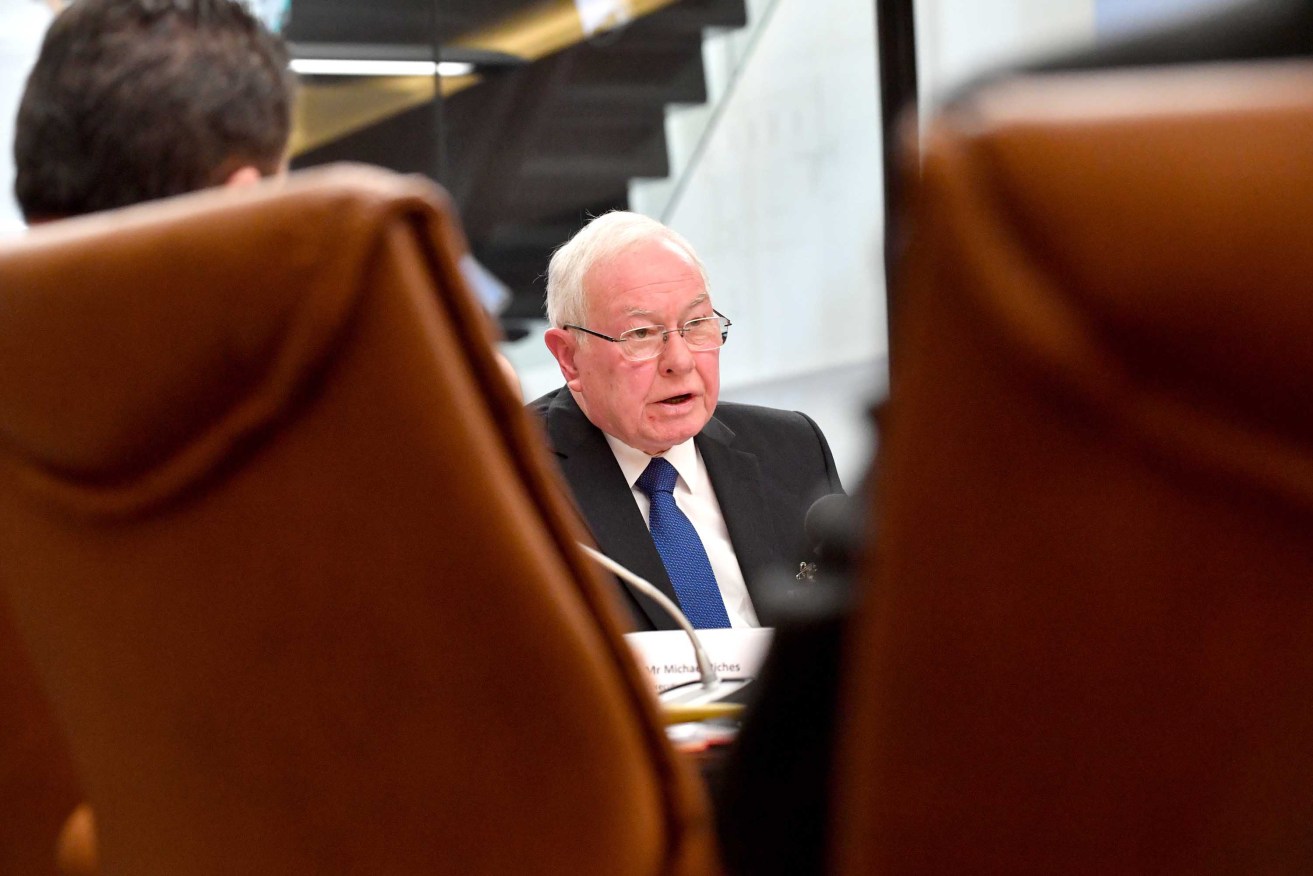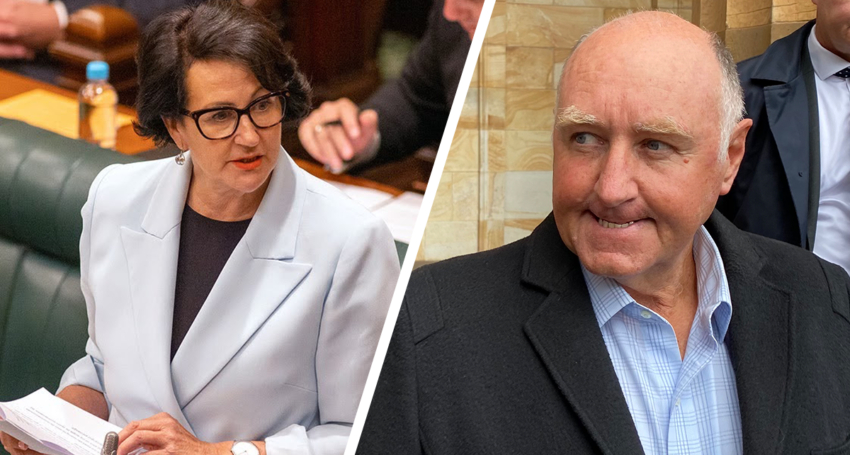Is our ICAC a show about nothing?
After being stripped of its powers to investigate maladministration, South Australia’s ICAC has been found to have committed maladministration. Matthew Abraham examines the latest absurdities enveloping our anti-corruption commission.


Former anti-corruption commissioner Bruce Lander was in charge during the Hanlon investigation. Photo: Sam Wundke/AAP
Seinfeld character George Costanza, a well-meaning hapless grifter, once found himself in a trademark tangle.
It wasn’t an isolated incident for George, played superbly by actor Jason Alexander in the long-running US sitcom, wrongly labelled as a “show about nothing”.
Costanza’s woes were always self-inflicted and yet he managed to somehow scrape through.
In the episode “The Boyfriend”, Costanza lies to a US employment officer in an attempt to get a 13-week extension to his unemployment benefits. He tells her he had been interviewed for a job as a salesman by Vandelay Industries, a firm that makes “latex and latex-related products”.
The job offer didn’t exist. Nor did Vandelay Industries. And yet the name “Vandelay” became Costanza’s go-to device when he needed to conjure up a plausible name, such as for a phony job or a favourite non-existent author or friend, such as Art Vandelay, an “importer-exporter”.
The name Vandelay Industries springs to mind when reading a 203-page report tabled in parliament this week into our Independent Commission Against Corruption’s failed investigation and prosecution of former Renewal SA boss, John Hanlon.
The report’s findings of ICAC’s maladministration and “incompetence or negligence” raise a question that has been staring us in the face for a couple of years now. What is the point of ICAC?
Has it become a name for an entity that might as well not exist?
The review of the “investigation and prosecution of Mr John Hanlon” was the work of a respected Sydney barrister Philip Strickland SC in his role as Inspector of ICAC.
As InDaily reported this week, Hanlon was twice prosecuted after an ICAC investigation, but walked free both times after the Director of Public Prosecution’s cases “collapsed in spectacular fashion”.
Strickland’s report into the events that contributed to that spectacular collapse – one that has already cost taxpayers hundreds of thousands of dollars and may yet cost much more – is damning.
He found maladministration at an “institutional level” with the ICAC investigation, with “substantial mismanagement … resulting in incompetence or negligence”.
The review found ICAC’s investigators in Germany broke international law and then ICAC failed to disclose this to the Director of Public Prosecutions, who was running the shambolic, failed case against Hanlon.
Importantly, Strickland’s review exonerates the current ICAC Commissioner Ann Vanstone KC from any responsibility for an investigation conducted under her predecessor, Bruce Lander KC. You can never have too many KCs.
Strickland cited “ICAC’s failure to make proper inquiries, including by obtaining legal advice, about its authority to conduct and the legality of conducting investigations in Germany” and ICAC’s failure to tell the DPP about such matters.

Former Attorney-General Vickie Chapman passed on an anonymous complaint about former Renewal SA boss John Hanlon.
The Hanlon case is unlikely to die a quiet death.
The Strickland review marks the end of any further official probe into ICAC’s methods – it was referred to the Office of the Inspector by Labor’s Attorney-General Kyam Maher.
But our state parliament hasn’t finished with it yet, not by a long shot.
Many MPs in both houses of state parliament remain angry at ICAC’s handling of the case.
It was initially referred to ICAC by former Liberal Attorney-General Vickie Chapman after she received an anonymous complaint.
As one senior source put it to me this week: “We’re not idiots. We know what’s going on here. There’s a lot more to come out. Poor old Vanstone has had to clean up the mess left to her.
“If anyone wants to understand why 69 members of parliament across four parties voted unanimously to change ICAC, it’s because of its handling of the Hanlon case.”
This is a reference to changes rushed unanimously through both houses of state Parliament in September 2021, barely months before the March 2022 state election.
These hobbled ICAC, stripping its powers to investigate misconduct or maladministration and depositing these in the lap of the state’s Ombudsman.
As InDaily’s David Washington reported at the time, the changes not only strictly narrowed the definition of corruption, they also added significant protections for politicians from ICAC’s future, and even retrospective, reach.
The ominous “there’s more to come out” line refers to what is now likely to unfold when parliament’s Crime and Public Integrity Policy Committee, or CPIPC – starts to unpack some of Strickland’s work.
It’s been noted by some keen observers that in Strickland’s introduction, he explains that ICAC chief Ann Vanstone gave him an authority to publish in his report “information that would otherwise constitute an offence” against Section 54 of the current ICAC Act. Nice to have, just in case.
But they question why Hanlon wasn’t given the same effective waiver from ICAC.
It’s likely this little-known but powerful parliamentary committee will call a range of witnesses, particularly Hanlon’s lawyer David Edwardson KC, to help it colour in the missing squares.
The upper house committee includes SA-Best’s Frank Pangallo, a strident critic of ICAC’s methods.
Strickland’s review into the investigation of the former Renewal SA boss is thorough and impartial, as we’d expect, but does contain some jarring findings for those of us not versed in the intricacies of the law.
While he found maladministration in the German trip by ICAC investigators, he did not find the individuals guilty of maladministration. Instead, he found it was maladministration by ICAC as an institution.
He found ICAC’s secret recording of conversations between Hanlon and senior Renewal SA manager Georgina Vasilevski about their Melbourne trip – one of the central, contested matters in the legal fight – did not “cause any unreasonable invasion of privacy or undue prejudice to the reputation of any person”.
Hanlon and Vasilevski, whose names have been dragged through the ICAC wringer, may have a very different definition of privacy and undue prejudice to their reputations.
Strickland includes selected passages of those secret recordings in his report. This seems unnecessary, but I’m no KC.
Senior Cabinet minister Tom Koutsantonis has been tweeting choice excerpts of Strickland’s report, including that to him what stands out is “the number of ICAC staff with the term ‘former’ before their title”.
On Wednesday, he tweeted this passage – “paragraph 297, Page 82 of 203” – referring to Lander’s responses:
“While he was unable to recall details of many of the questions put to him, he was forthright in his answers and assisted me to the extent that his memory allowed.”
Remember, Koutsantonis has been through the ICAC wringer.
In 2015, ICAC under Bruce Lander cleared Koutsantonis and then Premier Jay Weatherill of wrongdoing over the controversial Gillman land deal, but found that Koutsantonis had used “profanities” during meetings with public servants.
Strickland made no recommendation of any further action against any of the ICAC staff involved in the Hanlon mess and is pleased Commissioner Vanstone has already put several changes in place to try to prevent a repeat.
Despite finding “a number of significant errors” in ICAC’s handling of the case, he found the investigation and the referral to ICAC were “reasonable and appropriate”.
They were “important in order to detect, prevent, and minimise corruption in public office”.
That’d be excellent, if ICAC had any form in delivering the goods.
Looking at the outfit’s track record since its creation by the Weatherill Labor Government in late 2012, you’d be forgiven for thinking that corruption in any grave sense doesn’t exist in SA, or if it does exist our ICAC has struggled to find it and successfully bring it to court.
Former Premier Mike Rann resisted creating a state ICAC, arguing a federal ICAC would be better equipped to do the job because crime and corruption didn’t respect state borders.
With a federal ICAC now in motion, our good friend Art Vandelay may be thinking the same thing.
Matthew Abraham is InDaily’s political columnist. Matthew can be found on Twitter as @kevcorduroy. It’s a long story.




